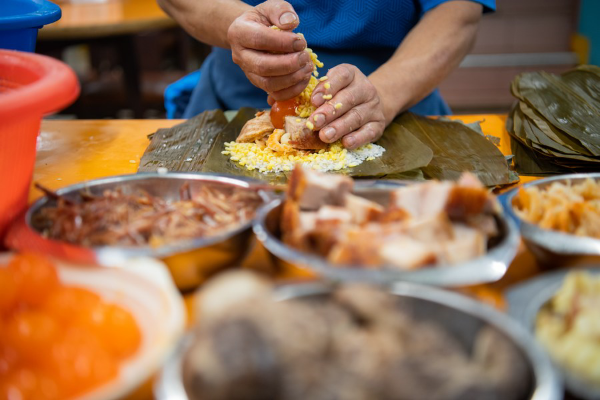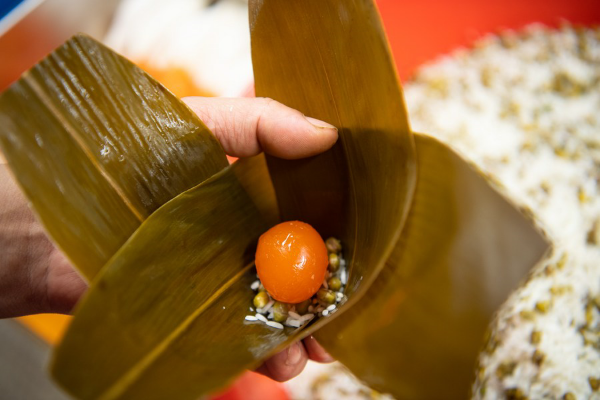Macao eateries put good taste on the menu as they serve up tradition


MACAO - Selling a number of delicacies ranging from staple food and snacks to dairy and tea, the many famous stores located at different spots of the old town area of the Macao Peninsula have become the calling card for traditional food and unique souvenirs in the Macao Special Administrative Region.
Tam Soi Wing is the third-generation inheritor of Pastelaria Chui Heong, a pastry shop known for its handmade chargrilled almond cookies on the narrow, yet bustling Rua do Gamboa street.
"In the beginning, my grandfather made the cookies and my grandmother would carry them around selling them. In the 1970s, my mother and uncle took over and bought a shop. In 2020, sponsored by the SAR government, I bought this new shop and the old one was turned into a factory," she says.
A tourist surnamed Su from Guangzhou, capital of Guangdong province, says she came to Chui Heong particularly for the handmade pastries. "It took me a long time to find the store," she says. "I like pastries made in the traditional way."
Not far from Chui Heong sits Lok Kei Noodles, a restaurant featured in the Michelin guide for 12 years, famous among the locals and tourists alike for its bamboo-pressed noodles and crab congee.
Lei Man Lung is the third-generation inheritor of Lok Kei. Sitting on a giant bamboo rod, Lei jumps up and down for nearly an hour to flatten flour dough.
"Making bamboo-pressed noodles requires great effort," Lei says. "But it helps make the noodles smoother, more elastic, and therefore more tasty."
Close by, Lan Heong Kuok, a typical Cantonese tea house, is crowded with customers, who come specially for the traditional dim sum.
"My father founded the restaurant 59 years ago," says Chan Zi Wai. "In the old days, customers would read newspapers, now they check their phones. Most other things remain unchanged."
Shortly before the Dragon Boat Festival, which fell on June 3 this year, the restaurant was busy selling zongzi, a festive food made of glutinous rice stuffed with different fillings and wrapped with bamboo leaves.
Every year, around this time, the first floor of the three-story building is turned into a workshop. Employees make zongzi on site with fillings of pork, beans and salted egg yolk, and hang their products on iron racks for display.
"We sell tens of thousands of zongzi each Dragon Boat Festival," says Chan.
With decades or even centuries of history, these old food stores now face new challenges, especially the COVID-19 pandemic.

Since the initial outbreak in early 2020, the number of tourists to Macao has fallen sharply, dealing a blow to small and micro businesses. Official data shows that visitor arrivals in Macao totaled over 7.7 million in 2021, an increase of 30.7 percent year-on-year, and yet a decline of over 80 percent compared to 2019.
These small eateries are trying to be more innovative.
"We are thinking about selling online to mainland customers," Tam says.
To Lei, the solution is to make traditional foods more tailored to the tastes of modern customers. His restaurant has invented new dishes, but Lei now faces another challenge-inheritance. Making bamboo-pressed noodles not only requires great physical strength, but is also specialized.
According to the Cultural Affairs Bureau of the Macao SAR, only a few restaurants in Macao currently make bamboo-pressed noodles. In 2020, the bureau listed the skill as an intangible cultural heritage of the SAR.
"My grandfather did it to make a living," Lei says. "For me, it's about maintaining the family reputation and inheriting the skill."
Chan, now 65, runs Lan Heong Kuok together with his two elder sisters. "Our children don't want to take over," he says. "They think this is too much hard work."
Since the pandemic, business dropped by 30 to 40 percent. "I'm grateful already that Macao has done a good job controlling the pandemic and stimulating the economy," says Chan. "We can only do our best, and hope for the best."




































